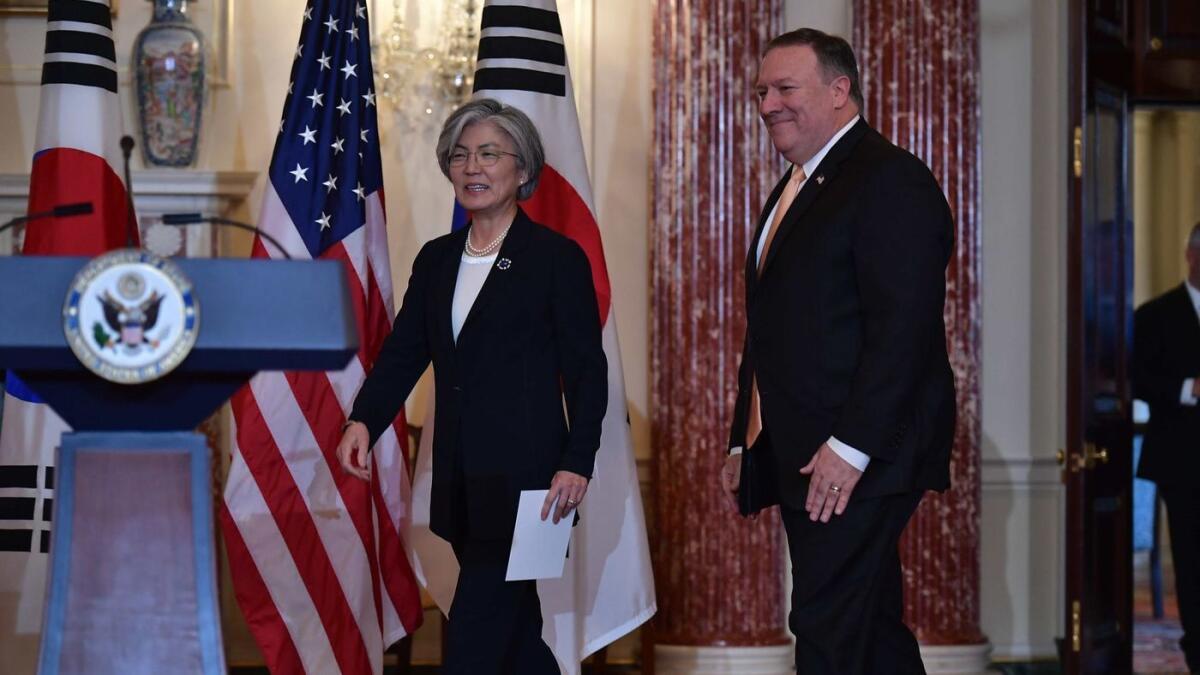U.S. officials offer economic aid, security assurances if North Korea eliminates nuclear program

- Share via
Reporting from Washington — The U.S. is prepared to quickly lift sanctions on North Korea and promise its leader, Kim Jong Un, that it would not seek to oust him from power, senior officials said Sunday, sketching out the terms of a possible deal if Kim agrees to give up his nuclear weapons.
“We will have to provide security assurances” to Kim as part of a nuclear deal, Secretary of State Mike Pompeo said on “Fox News Sunday.” “Our hope is that Kim wants a strategic change, and President Trump is prepared to help.”
U.S. officials emphasized that they are not close to finalizing an agreement with Kim, a month before he and President Trump are scheduled to meet at an unprecedented summit in Singapore. They also stressed that Kim will have to agree to sweeping concessions up front, unlike in previous nuclear deals with Pyongyang that were phased in and ultimately fell apart.
“We’re prepared to open trade and investment as soon as we can,” John Bolton, Trump’s national security advisor, said on ABC’s “This Week.” Before that can occur, he added, “We want to see the denuclearization process so completely underway that it’s irreversible.”
Separately Sunday, Trump vowed to help smartphone and telecom equipment maker ZTE, only weeks after the U.S. banned American firms from selling parts to the Chinese company for seven years. The Commerce Department found ZTE had failed to abide by an agreement reached after it was found to have illegally shipped goods to Iran. The president’s surprise move was seen as a concession to China, whose cooperation will be critical to the success of the North Korea talks.
Trump said in a tweet that he and China’s president, Xi Jinping, “are working together to give massive Chinese phone company, ZTE, a way to get back into business, fast. Too many jobs in China lost. Commerce Department has been instructed to get it done!”
It remains unclear whether Trump’s advisors have reached agreement among themselves about their negotiating goals and how far they are prepared to push North Korea.
Bolton appeared to widen the scope of U.S. demands, insisting that the U.S. also wanted to put elimination of North Korea’s chemical and biological weapons and other issues on the table.
“I think we need to look at their chemical and biological weapons programs,” and the return of South Korean and Japanese citizens abducted by the North, Bolton said.
Pyongyang has long sought assurances the U.S. would not invade the North and is believed to have pursued nuclear weapons in an attempt to ensure the survival of the regime by raising the threat that any U.S. move to oust Kim could escalate into nuclear war.
But it is a matter of fierce debate among diplomats and Korea experts whether Kim would surrender his nuclear arsenal. He has said he is willing to “denuclearize” the Korean peninsula, but it is not clear he means what Washington means — and what concessions he would insist on from the U.S. and its allies.
Pompeo called Kim’s announcement last week that North Korea would destroy its nuclear testing site “a good first step.”
For decades, the U.S. and North Korea have discussed an agreement in which Pyongyang would abandon its nuclear activities in return for a formal peace treaty ending the Korean conflict and economic assistance for the impoverished regime.
But the negotiations have repeatedly broken down, often amid recriminations on both sides that the other was not complying with the terms.
To avoid repeating that pattern, Pompeo implied, Kim would have to make sweeping concessions up front, which would be matched quickly by U.S. private investment in North Korea, focused on improving its antiquated power grid and boosting its food supply.
U.S. government aid to the North is not likely, Pompeo and Bolton said.
“Kim understands that this will have to be big and special,” added Pompeo, who returned early Thursday from what he called a “productive” meeting with Kim in Pyongyang. “I think Kim appreciates the fact this is going to have to be different; both sides have to come to play.”
He brought home three American prisoners freed by Kim in what Pompeo said was an important gesture that helped pave the way for the meeting.
Pompeo implied that the Trump administration would not seek to overthrow Kim if he surrendered his nuclear stockpile.
The U.S. and North Korea have been hostile adversaries for nearly seven decades, since the Korean War, with Pyongyang isolated from most nations.
In addition to possessing an unknown number of nuclear devices, North Korea has more than 1.2 million troops, an extensive if increasingly obsolete ground force that poses a direct threat to Seoul, only 35 miles from the demilitarized zone dividing North and South, if hostilities broke out.
The U.S. maintains major air and Navy bases in Japan, and the Pentagon keeps up to 32,000 American troops in South Korea, part of a huge military presence in northeast Asia to support a defense treaty that requires the United States to come to South Korea’s aid if it is attacked.
It’s unclear if Kim will insist on a drawdown in U.S. forces or promises that the U.S. would not employ nuclear weapons on the Korean peninsula, which has long been a critical if unstated component of the U.S. plan to defend South Korea as a last resort.
Twitter: @davidcloudLAT
More to Read
Sign up for Essential California
The most important California stories and recommendations in your inbox every morning.
You may occasionally receive promotional content from the Los Angeles Times.











